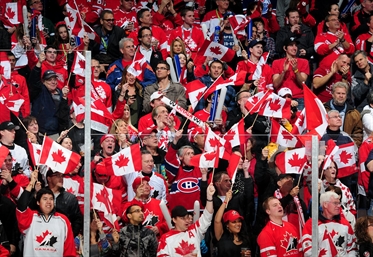Welcome to the IIHF WJC!
Welcome to the IIHF WJC!
Hockey fever off the charts in Montreal, Toronto

 Toronto and Montreal are thrilled to be co-hosting the 2015 IIHF World Junior Championship, a feat they'll repeat in 2017. Photo: Andy Devlin / HHOF-IIHF Images
Toronto and Montreal are thrilled to be co-hosting the 2015 IIHF World Junior Championship, a feat they'll repeat in 2017. Photo: Andy Devlin / HHOF-IIHF Images
For hockey fans in Canada – and increasingly in Europe and the United States – plans for the holidays often centre on the 31 games at this annual showcase of the world’s top U20 talent.
At last, the time has arrived. And you couldn’t have picked two better host cities for 2015.
Montreal has the most storied history of any NHL franchise. Just think of the legends who led the Canadiens to hoist a league-record 24 Stanley Cups: Howie Morenz, Maurice “Rocket” Richard, Jean Beliveau, Guy Lafleur, Patrick Roy.
This year, goalie Carey Price and defenceman P.K. Subban – World Junior alumni both – added luster to the Habs’ international reputation by taking part in Canada’s Olympic gold medal repeat at the Sochi Olympics.
It’s all great inspiration for the five teams that will suit up in preliminary and playoff round action at the Bell Centre.
When former Montreal captain and Finnish star Saku Koivu was honoured in a pre-game ceremony on December 18, he told the crowd: “Every NHL player should have the opportunity to play in Montreal in front of the best fans in the world.” That’s a noble sentiment – but undoubtedly Torontonians would quibble with his assertion.
Toronto has arguably the most passionate and committed hockey fans anywhere. Even though the Leafs, winners of 13 Stanley Cups, haven’t triumphed since 1967, Forbes Magazine recently valued them at $1.3-billion – more than any other team.
The Ontario capital is also where the great Swedish defenceman Borje Salming (voted to the IIHF’s Centennial All-Star Team in 2008) broke down barriers for European players in the 1970’s NHL. Thus, it feels fitting that five European teams will play here in the preliminary round.
Continue readingMats Sundin, Darryl Sittler, and Frank Mahovlich are some other former Toronto superstars who claimed the spotlight in international hockey.
This year, Toronto will also take centre stage as the sole host for the semi-finals and medal games, while Montreal will get that privilege when the two rival cities co-host again in 2017. This is the first time Montreal has had World Junior action since 1978. Toronto’s last taste was two games in 1986 when nearby Hamilton was the main venue.
It wouldn’t be surprising if these two cities beat the previous World Junior attendance record of 444,718, set in 2012 in Calgary and Edmonton. But otherwise, there could be plenty of surprises. This has become an increasingly unpredictable tournament, devoid of dynasties. That’s part of its appeal.
Can Canada win gold for the first time since Ottawa 2009 with Connor McDavid, widely touted as the next Sidney Crosby? Or will the Americans, headlined by fellow potential #1 overall draft pick Jack Eichel, spoil their archrivals’ party?
The Swedes have made three straight finals – is it their time to top the podium again for the first time since 2012? Coming off a victory over WHL, OHL, and QMJHL all-stars in the Subway Super Series, are the Russians poised to win gold as they did in 2011 with coach Valeri Bragin leading the way?
And especially with goalie Juuse Saros (voted a tournament all-star in 2014), do the Finns deserve more respect coming in as the defending champs?
Don’t forget: it’s not strictly a five-team race. Less highly touted nations could play the role of spoiler this year.
The Czechs, seeking their first medal since 2005’s bronze, are creeping back into the conversation, and boast high-octane returning forwards like Jakub Vrana and David Pastrnak. Slovakia has finished eighth at four of the last five World Juniors, but most of the players compete together on a U20 squad in the Slovak Extraliga, giving them extra familiarity with one another.
Since being promoted to the elite division in 2009, the Swiss have stayed up for six straight years. Known for their defensive tenacity, they’re also starting to develop some game-breaking attackers such as 18-year-old Kevin Fiala (chosen 11th overall by the Nashville Predators in June).
The lowest-ranked teams, Germany and Denmark, could be the best of their kind in years. Germany has good depth and plenty of returning players. The newly promoted Danes have potential NHL snipers with the likes of Nikolaj Ehlers and Oliver Bjorkstrand.
Are you ready for the first puck drop at the IIHF World Junior Championship? It’s the most wonderful time of the year.
Back to Overview


















































